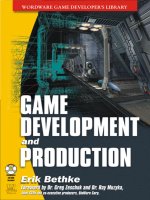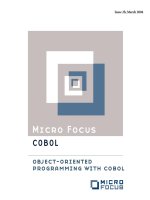Object oriented Game Development -P11 ppt
Bạn đang xem bản rút gọn của tài liệu. Xem và tải ngay bản đầy đủ của tài liệu tại đây (208.51 KB, 30 trang )
template<class T>
T * mem_Pool<T>::Allocate()
{
T * pItem = m_FreeItems.top();
m_FreeItems.pop();
return( pItem );
}
template<class T>
void mem_Pool<T>::Free( T * pItem )
{
// Some security checks required here, to
// prevent multiple frees, frees of invalid data
// and so on.
m_FreeItems.push( pItem );
}
template<class T>
void mem_Pool<T>::FreeAll()
{
m_FreeItems.clear();
for( int i = 0; i < m_iNumItems; ++i )
{
m_FreeItems.push( &m_Items[i] );
}
}
Notice that the pool class allocates an array of objects dynamically. This means
that any class that requires pooling must provide a default constructor. Notice
also that simply allocating from the pool returns an object that may have been
used previously and so contains ‘garbage’: no constructor will have been called.
This motivates the use of the placement form of operator
new: this calls a con-
structor on an existing memory block:
class Duck
{
public:
enum Gender { DUCK, DRAKE };
enum Breed { MALLARD, POCHARD, RUDDY, TUFTED };
Duck( Breed eBreed, Gender eGender );
// etc.
};
Object-oriented game development286
8985 OOGD_C07.QXD 2/12/03 1:07 pm Page 286
namespace
{
mem_Pool<Duck> s_DuckPool( 100 );
}
Duck * pDuck = s_DuckPool.Allocate();
// Call placement new on our raw data.
new (pDuck) Duck( MALLARD, DRAKE );
Some ad hoc tests on my PIII 500 laptop indicate the pool class to be about ten
times faster than
malloc(). The class is extremely simple and robust, and does
not demand the sort of person-power resources that a global allocator does.
Furthermore, plumbing it in to your code is as simple as adding operator new
and delete for each class to be pool allocated:
3
// Thing.hpp
class Thing
{
public:
void * operator new( size_t n );
void operator delete( void * p );
};
// Thing.cpp
namespace
{
const int MAX_THINGS = 100;
mem_Pool<Thing> s_Pool( MAX_THINGS );
}
void * Thing::operator new ( size_t )
{
return( s_Pool.Allocate() );
}
void Thing::operator delete( void * p )
{
s_Pool.Free( reinterpret_cast<Thing *>(p) );
}
Game objects 287
3You may also wish to add a static Initialise() function to the class to call pool<T>::FreeAll()
at certain points within the code.
8985 OOGD_C07.QXD 2/12/03 1:07 pm Page 287
A really dull application for pools
In the course of development, you’ll write some really fun code and you’ll write
some really bland stuff. Annoyingly, a lot of how your game performs may well
be dictated by how well the dull stuff runs.
There isn’t much duller stuff than linked lists. Yet, if you need a data struc-
ture where you can add and remove items in constant time, you’d be
hard-pushed to find a better container class. The temptation to use STL’s
std::list class is overwhelming, but a cursory investigation of any of the
common implementations will yield the slightly disturbing realisation that a
fair number of calls to operators
new and delete take place during add and
remove operations. Now, for some purposes that may not matter – if you do
only one or two per game loop, big deal. But if you’re adding and removing lots
of things from lists on a regular basis, then
new and delete are going to hurt.
So why are
new and delete being called? If you require objects to be in sev-
eral lists at once, then the link fields need to be independent of the object in a
node class. And it’s the allocation and freeing of these nodes that can cause the
invocation of dynamic memory routines.
The thought occurs: why not write an allocator for nodes that uses our
pools, and plug it into the STL list class? After all, they provide that nice little
second template argument:
template<class T,class A = allocator<T> >
class list { /*…*/ };
Brilliant! Except for the fact that it really doesn’t work very well. It depends too
critically on which particular version of STL you are using, so although your
solution may possibly be made to work for one version of one vendor’s library,
it is quite unportable across versions and platforms.
For this reason, it’s usually best to write your own high-performance con-
tainer classes for those situations (and there will be many in a typical game)
where STL will just not cut the mustard. But we digress.
Asymmetric heap allocation
Imagine an infinite amount of RAM to play with. You could allocate and allo-
cate and allocate, and not once would you need to free. Which is great, because
it’s really the freeing that catalyses the fragmentation process.
Now, it’ll be quite a while before PCs and consoles have an infinite quantity
of free store. However, the only constraint you need be concerned with is not
an infinite amount but just all that your game requires. In fact, we can be a bit
more specific than that, because if the game is level-based, and we know ahead
of time exactly how much we need for a level, then we can pre-allocate it at the
start of the level, allocate when required, and the only free we will ever need is
the release of everything at the end of the level.
Object-oriented game development288
8985 OOGD_C07.QXD 2/12/03 1:07 pm Page 288
This technique generalises to any object or family of objects whose exact
maximum storage requirements are known ahead of time. The allocator – called
an asymmetric heap because it supports only allocation of blocks, not freeing bar
the ability to free everything – is an even simpler class to implement than the
pool allocator:
// mem_AsymmetricHeap.hpp
class mem_AsymmetricHeap
{
// This constructor creates a heap of the
// requested size using new.
mem_AsymmetricHeap( int iHeapBytes );
// Constructs a heap using a pre-allocated block
// of memory.
mem_AsymmetricHeap( char * pMem, int iHeapBytes );
~mem_AsymmetricHeap();
// The required allocate and free methods.
void * Allocate( int iSizeBytes );
void FreeAll();
// Various stats.
int GetBytesAllocated() const;
int GetBytesFree() const;
private:
// Pointer to the managed block.
char * m_pData;
// Precomputed end of the heap.
char * m_pEndOfData;
// Where we get the next allocation from.
char * m_pNextAllocation;
// Size of the heap.
int m_iHeapBytes;
// Should the memory be freed on destruction?
bool m_bDeleteOnDestruct
};
Game objects 289
8985 OOGD_C07.QXD 2/12/03 1:07 pm Page 289
// mem_AsymmetricHeap.cpp
#include "mem_AsymmetricHeap.hpp"
mem_AsymmetricHeap::mem_AsymmetricHeap( int iHeapBytes )
: m_pData( new char [ iHeapBytes ] )
, m_pEndOfData( m_pData + iHeapBytes )
, m_pNextAllocation( m_pData )
, m_iHeapBytes( iHeapBytes )
, m_bDeleteOnDestruct( true )
{
}
mem_AsymmetricHeap::
mem_AsymmetricHeap( char * pMem, int iBytes )
: m_pData( pMem )
, m_pEndOfData( pMem + iBytes )
, m_pNextAllocation( pMem )
, m_iHeapBytes( iBytes )
, m_bDeleteOnDestruct( false )
{
}
mem_AsymmetricHeap::~mem_AsymmetricHeap()
{
if ( m_bDeleteOnDestruct )
{
delete [] m_pData;
}
}
void * mem_AsymmetricHeap::Allocate( int iSize )
{
void * pMem = 0;
// Ensure we have enough space left.
if ( m_pNextAllocation + iSize < m_pEndOfData )
{
pMem = m_pNextAllocation;
m_pNextAllocation += iSize;
}
return( pMem );
}
void mem_AsymmetricHeap::FreeAll()
{
// You can’t get much faster than this!
m_pNextAllocation = m_pData;
}
Object-oriented game development290
8985 OOGD_C07.QXD 2/12/03 1:07 pm Page 290
The remaining methods, along with the required bullet-proofing, and other
bells and whistles such as alignment, are left as exercises for the reader.
Control your assets
Having said all I have about fragmentation, you may be forgiven for thinking
that I’m a bit blasé about it. You’d be wrong. In some applications, there comes a
time when fragmentation doesn’t just slow things down, it actually brings down
the whole house of cards. Witness this error message from a recent project:
Memory allocation failure
Requested size: 62480
Free memory: 223106
Fragmentation has left memory in such a state that there is more than enough
RAM free; it’s just formed of itty bitty blocks of memory that are no use on
their own.
Time to panic? Not quite yet. The first step is to get rid of anything in
memory that is no longer needed until there is enough RAM. The scary bit
comes when you realise that the error message appeared after we’d done that.
Time to panic now? No, we’ll take a deep breath and hold on a moment
longer. The next step to take here is for some sort of block merging to be per-
formed. To be able to perform this efficiently, internally your memory allocator
ideally needs to support relocatable blocks. Now, to be able to do this, the access
to the things that can be relocated needs to be controlled carefully, because
simply caching a pointer could lead you to accessing hyperspace if the object is
moved. Using some kind of handle will solve this problem – we will discuss han-
dles shortly.
This motivates us to control our game resources carefully in databases.
Within these databases, we can shuffle and shunt around the memory-hogging
resources at will without adversely affecting the remainder of the game.
We’ll look at the asset management issue in some detail in a later chapter.
Strings
If there is one class above all that is going to fragment your memory, then it is
probably going to be the string. In fact, you don’t even need to have a class to
do it; just use a combination of char *’s, functions such as
strdup() and
free(), and you are almost just as likely to suffer.
What is it about strings that hammers allocators? Well, for starters, they are
usually small and they are all different sizes. If you’re
malloc()’ing and free()’
ing lots of one- and two-byte strings, then you are going to tax the heap man-
ager beyond breaking point eventually.
But there is a further – related – problem. Consider the programmer who
writes a string class because they hate having to use ugly functions such as
strcmp(), strdup() and strcpy(), and having to chase down all those string
Game objects 291
8985 OOGD_C07.QXD 2/12/03 1:07 pm Page 291
pointer leaks. So they write a string class, and this allows such semantic neat-
ness as:
String a = "hello";
String b = a;
Now there are (at least) two schools of thought as to what that innocent-
looking
= should do. One says that the request is to copy a string, so let’s do just
that. Schematically:
strcpy( b.m_pCharPtr, a.m_pCharPtr );
However, the second school says that this is wasteful. If b never changes, why
not just sneakily cache the pointer?
b.m_pCharPtr = a.m_pCharPtr;
But what happens if b changes? Well, we then need to copy a into b and update
b. This scheme – called copy-on-write (COW) – is implemented by many string
classes up and down the land. It opens up the can of worms (which is what
COW really stands for) inside Pandora’s box, because the string class suddenly
becomes a complex, reference-counting and rather top-heavy affair, rather than
the high-performance little beast we hoped for.
So if we’re to avoid COW, we are then forced into using strings that forcibly
allocate on creation/copy/assignment, and free on destruction, including pass-
ing out of scope. In other words, strings can generate a substantial number of
hits to the memory management system(s), slowing performance and leading to
fragmentation. Given that C++ has a licence to create temporary objects when-
ever it feels like it, the tendency of programmers who know how strings behave
is to forgo using a string class and stick with the combination of static arrays
and the C standard library interface. Unfortunately, this does reject some of the
power that can be derived from a string class. For example, consider a hash table
that maps names to objects:
template<class Key,class Type>
class hash_table
{
// Your implementation here.
};
namespace
{
hash_table<char *,GameObject *> s_ObjectMap;
}
Object-oriented game development292
8985 OOGD_C07.QXD 2/12/03 1:07 pm Page 292
The problem with this is that if the hash table uses operator== to compare
keys, then you will compare pointers to strings, not the strings themselves. One
possibility is to create a string proxy class that turns a pointer into a comparable
object – a ‘lite’ or ‘diet’ string, if you will:
class string_proxy
{
public:
string_proxy()
: m_pString(0)
{
}
string_proxy( const char * pString )
: m_pString( pString )
{
}
bool operator==( const string_proxy & that ) const
{
return(!strcmp( m_pString, that.m_pString ));
}
private:
const char * m_pString;
};
namespace
{
hash_table<string_proxy,GameObject *> s_ObjectMap;
}
This works reasonably well, but beware of those string pointers! Consider the
following code:
namespace
{
string_proxy s_strText;
}
void foo( const char * pText )
{
char cBuffer[256];
Game objects 293
8985 OOGD_C07.QXD 2/12/03 1:07 pm Page 293
strcpy( cBuffer, pText );
s_strText = string_proxy( cBuffer );
}
void bar()
{
int x;
// Some stuff involving x.
}
void main()
{
foo( "hello" );
bar();
if (s_strText == string_proxy( "hello" ) )
{
printf( "yes!\n" );
}
else
{
printf( "no!\n" );
}
}
This will – at least some of the time – print ‘no!’ and other times may print ‘yes!’
or perhaps just crash. Why? Because
cBuffer is allocated on the stack, and the
call to
bar() can overwrite the region where the text was, and the string proxy
is pointing to. Boy, did I have fun with those bugs!
We are left with the distinct impression that a string class is still the least bad
of several evils. How might we go about creating one that doesn’t fragment, isn’t
slower than a snail on tranquillisers and doesn’t leave us with dangling pointers?
One way – a poor way – is to create strings with fixed-size buffers of the
maximum expected string length:
class string
{
public:
// A string interface here.
private:
enum { MAX_CAPACITY = 256; }
char m_cBuffer[ MAX_CAPACITY ];
};
Object-oriented game development294
8985 OOGD_C07.QXD 2/12/03 1:07 pm Page 294
The trouble with this is that it is very wasteful: if most strings are shortish – say
16–32 characters long – then we are carrying around a lot of dead storage space.
It might not sound much, but you could well be scrabbling around for that
space at the end of the project.
Our preferred solution is to use a series of pool allocators for strings. Starting
with a minimum string buffer length (say 16), we allocate a pool for 16-character-
length strings, another for 32-character strings, and so on up to a maximum string
length. By allowing the user to control how many strings of each length can be
allocated, we can bound the amount of memory we allocate to strings, and we
can customise the sizes according to the game’s string usage pattern.
Strings then allocate their buffers from the pools. As they grow, they allo-
cate from the pool of the smallest suitable size that can contain the new length.
Since the strings use pool allocators, no fragmentation of string memory occurs,
and the allocation and free processes are very fast. And there are no pointer
issues to fret over. Job done.
The moral of the tale is this: prefer local object allocation strategies to global ones.
In the end, our game should be a collection of loosely coupled components. This
degree of independence means that if we solve the memory allocation issues
within the components, then we get the global level pretty much for free. Hurrah!
But – and there’s always a but – some people insist that this isn’t the whole
story. And they have a point. They say that there are reasons why you may take
the step of writing a global allocator early on. It’s just that those reasons have
nothing to do with performance or fragmentation. In fact, given that your allo-
cation strategies will depend critically on your pattern of usage, you will need
some sort of mechanism to instrument the existing allocator so that you can
find out what those patterns are. Calls to
new and delete should be logged,
allowing you to trace leaks and multiple deletions and also to build up a picture
of how your game uses heap memory.
These are fine motivations. However, they should be evaluated in the con-
text of the priorities of the project, and they may do more harm than good.
Consider the following code skeleton:
// Memory.hpp
#if defined( DEBUG )
#define MEM_LogNew( Class )\
new( __FILE__,__LINE__) Class
// Provide a new ‘new’ that logs the line and file the
// memory was allocated in.
void *
operator new(size_t size, const char * pFile, int iLine);
#else
#define MEM_LogNew( Class )\
new Class
#endif
Game objects 295
8985 OOGD_C07.QXD 2/12/03 1:07 pm Page 295
Every time you need to create a new object and keep a record of its creation
(and presumably deletion), you need to include memory.hpp. That creates one
of those dependency things that is going to hamper reusability. If a colleague
feels like using one of your components but has already written a different
memory management system, then they’re going to have to modify the code.
Chances are, they won’t take the code, or they’ll sulk if they do.
In general, anything that causes universal (or near-universal) inclusion of
header files can seriously weaken the reuse potential of your systems, and
changes to those universal files will cause rebuilds left, right and centre. Of
course, we have heard this argument before.
There’s no reason why we can’t apply this same global technique at the
package local level, though. If each package keeps track of its own memory,
then we get the global tracking without the binding. Interestingly, though, at
the local level memory management can often be so simple that the problem
can simply dissolve away.
7.2.2 Referencing
So we’re writing (say) an air combat game, though the genre is largely unimpor-
tant for this discussion. We create a type of object called a missile, of which
there are two varieties: one that just flies in a path dictated by an axial thrust
and gravity, and another that homes in on a specific target that the player or
NPC has selected. It’s the latter object we’re interested in. Here’s a sketch of the
code sections we’re interested in:
class Missile : public GameObject
{
public:
// yada yada.
};
class HomingMissile : public Missile
{
public:
HomingMissile( /*stuff*/, GameObject * pTarget );
/*virtual*/ void Update( float dt );
// bada bing.
private:
GameObject * m_pTarget;
};
Object-oriented game development296
8985 OOGD_C07.QXD 2/12/03 1:07 pm Page 296
When the homing missile is created, we provide a target object that it should
head towards. When we update the missile, it does some sums to work out tra-
jectories and then adjusts itself accordingly:
void HomingMissile::Update( float dt )
{
MATHS::lin_Vector3 vTargetPos =
m_pTarget->GetPosition();
// Some maths, depending on how clever you are.
}
But we’re not concerned about the maths and physics at this moment. The
problem we need to address is this: suppose another missile blows up our target,
which is deleted (and potentially new objects such as explosions and debris put
in their place)? But hold on, our homing missile still has a pointer to a now
non-existent object, so next time it is updated we can be sure that something
undesirable will happen.
How do we solve this? It’s part of the general problem of how we reference
objects safely. One common method is to prevent the application from holding
pointers to allocated game objects at all. Instead, all object transactions use
object handles, which cannot be deleted. We then have some kind of object
management interface that accepts handles and returns the relevant data:
class ObjectManager
{
public:
ObjectHandle CreateObject( const char * pType );
void FreeObject( ObjectHandle hObject );
MATHS::lin_Vector3 GetPosition( ObjectHandle hObj );
private:
ObjectFactory * m_pFactory;
};
So what is an ObjectHandle exactly? In short, it’s anything you want it to be. It’s
called an opaque type because as far as the outside world – the client code – is con-
cerned, it cannot see what the type does. Only the
ObjectManager knows what to
do with handles – how to create them, validate them and dereference them.
As an oversimplified example, consider using a 32-bit integer as the handle
type:
typedef int ObjectHandle;
Game objects 297
8985 OOGD_C07.QXD 2/12/03 1:07 pm Page 297
Within the object manager, we have a table of pointers to objects that the inte-
ger indexes into:
// ObjectManager.cpp
namespace
{
const int MAX_OBJECTS = 200;
GameObject * s_Objects[ MAX_OBJECTS ];
int s_iNextFreeObject = 0;
}
Now whilst that’s not the whole story, suffice to say that many games use a
system such as this, so there is a lot to recommend it. Unfortunately, it’s not a
system that I favour. The main objection is that handles collapse type informa-
tion. We went to such pains to design an elegant object hierarchy, and now
we’ve reduced everything to either a lowest-common-denominator interface or
a hugely bloated monolithic one, because you need to be able to do anything
with a handle that you could do with a
GameObject or any of its subclasses.
Handles do have their uses, however, and we’ll discuss those later. To solve our
immediate problem, though, we can invoke the flexible reference-counting mecha-
nism we discussed in the previous section. Recall that we used a base class to
implement reference counting, which had a virtual function
OnUnreferenced()
and that was called when the reference count hits zero. This mechanism can be pig-
gybacked to do exactly what we require:
// GameObject.hpp
#include "comm_IsReferenceCounted.hpp"
class GameObject : public comm_IsReferenceCounted
{
};
// Scenery.hpp
#include "GameObject.hpp"
class Scenery : public GameObject
{
/*virtual*/
void OnUnreferenced();
};
// Scenery.cpp
#include "Scenery.hpp"
#include "mem_Pool.hpp"
Object-oriented game development298
8985 OOGD_C07.QXD 2/12/03 1:07 pm Page 298
namespace
{
int MAX_SCENERY = 111;
mem_Pool<Scenery> s_SceneryPool( MAX_SCENERY );
// Creator called by ObjectFactory.
GameObject * createScenery()
{
return( s_SceneryPool.Allocate() );
}
}
/*virtual*/
void Scenery::OnUnreferenced()
{
~Scenery();
s_SceneryPool.Free( this );
}
The only thing we have to watch out for is always to call Release() on pointers
to
GameObjects rather than delete. Protecting the destructor could enforce this
somewhat, but protected status is too easy to remove via inheritance to be
watertight, and making the destructor private would cause compiler errors since
we could never destroy the
GameObject class from a subclass.
There’s another little gotcha waiting to bite us when we allocate game
objects from a pool. Previously, we encountered problems because we held on to
a pointer to an object that was deleted. The pointer becomes invalid; consider-
ably more likely than not, it will address data inside a new object or point at
fragile memory manager data. Dereferencing it would be a disaster. However,
when we allocate objects from a pool, it is now extremely likely – indeed, given
long enough, 100% certain – that our cached pointer will point to the start of a
new object that is actually in use. Ouch! This is a subtle and annoying bug.
To get around this one, we need to create a smart pointer class. Also, when-
ever we create an object, we need to give it a unique identifier. The simplest way
is to use a 32-bit integer:
// GameObject.hpp
class GameObject
{
public:
GameObject();
int GetId() const { return m_iUniqueId; }
Game objects 299
8985 OOGD_C07.QXD 2/12/03 1:07 pm Page 299
// blah.
private:
int m_iUniqueId;
};
// GameObject.cpp
#include "GameObject.hpp"
namespace
{
int s_iIdGenerator = 0;
}
GameObject::GameObject()
: // …
, m_iUniqueId( s_iIdGenerator++ )
{
}
Our smart pointer class obtains the unique identifier when it is created. It can
then tell if the referred object is valid by comparing its cached identifier with
the actual ID of the object (which is safe because being in a pool, the data are
never deleted as such during game execution):
// ObjectPointer.hpp
class ObjectPointer
{
public:
ObjectPointer();
ObjectPointer( GameObject * pObject );
GameObject * operator*();
// Const versions of this, too.
private:
GameObject * m_pObject;
int m_iObjectId;
};
// ObjectPointer.cpp
#include "ObjectPointer.hpp"
#include "GameObject.hpp"
Object-oriented game development300
8985 OOGD_C07.QXD 2/12/03 1:07 pm Page 300
ObjectPointer::ObjectPointer()
: m_pObject( 0 )
, m_iObjectId( -1 )
{
}
ObjectPointer::ObjectPointer( GameObject * pObject )
: m_pObject( pObject )
, m_iObjectId( pObject->GetId() )
{
}
GameObject * ObjectPointer::operator*()
{
GameObject * pObject = 0;
if ( m_iObjectId == m_pObject->GetId() )
{
// The object is valid.
pObject = m_pObject;
}
return( pObject );
}
It should be stressed that this technique works only for pool objects, because of
the call to
GameObject::GetId() within operator*(). If the object has been
heap-allocated and subsequently deleted, and we make that call, then it’s Game
Over before the game’s over. So how can we make it work for an arbitrarily allo-
cated object? Well, the Achilles’ heel is that pointer, so perhaps if we ditch that,
we can use the ID value itself to refer to an object. Since the ID is a continuously
increasing integer, it won’t work as an index, and in fact even if it were, using
an index just gives us the same problem all over again. So how about a scheme
that looks up a table of existing objects, compares IDs and returns a pointer to
the referred object if it was found?
That works, but it is painfully slow if you do a modest amount of referenc-
ing and have a large (say, more than 100) set of objects. Even putting the
objects into a map or hash table keyed on the ID field would still make this a
costly operation.
Clearly, we need to be a bit cleverer if we want to have an efficient referenc-
ing system for heap-allocated objects. We’ll appeal to our good friend, the
reference count, to help us. Only this time, we are not reference counting the
object itself so much as the reference object that looks at it:
Game objects 301
8985 OOGD_C07.QXD 2/12/03 1:07 pm Page 301
template<class T>
class sys_Reference
{
public:
sys_Reference();
sys_Reference( T * pInstance );
~sys_Reference();
T * GetInstance();
const T * GetInstance() const;
// Returns the ref’d object or 0 if deleted.
void AddRef();
void DecRef();
int GetRefCount() const;
// The usual reference counting interface.
void Invalidate();
// Call this when the instance is deleted.
private:
T * m_pInstance;
int m_iRefCount;
};
template<class T>
sys_Reference<T>::sys_Reference()
: m_pInstance(0)
, m_iRefCount(0)
{
}
template<class T>
sys_Reference<T>::sys_Reference( T * pInstance )
: m_pInstance( pInstance )
, m_iRefCount(0)
{
}
template<class T>
sys_Reference<T>::~sys_Reference()
{
m_pInstance = 0;
}
Object-oriented game development302
8985 OOGD_C07.QXD 2/12/03 1:07 pm Page 302
template<class T>
const T * sys_Reference<T>::GetInstance() const
{
return( m_pInstance );
}
template<class T>
T * sys_Reference<T>::GetInstance()
{
return( m_pInstance );
}
template<class T>
void sys_Reference<T>::AddRef()
{
++m_iRefCount;
}
template<class T>
void sys_Reference<T>::DecRef()
{
m_iRefCount;
}
template<class T>
int sys_Reference<T>::GetRefCount() const
{
return( m_iRefCount );
}
template<class T>
void sys_Reference<T>::Invalidate()
{
m_pInstance = 0;
}
In itself, the reference class solves the problem only partially. Creating more
than one reference to an instance will really mess up the reference counter and
we’re back in Crashville. So now we reintroduce our handles, only this time
they point at a reference, not at an object:
template<class T>
class sys_Handle
{
Game objects 303
8985 OOGD_C07.QXD 2/12/03 1:07 pm Page 303
public:
sys_Handle();
sys_Handle( sys_Reference<T> * pStub );
~sys_Handle();
void Release();
// Relinquish use of the controlled object. All
// dereference operations will return NULL after
// this call. This is called automatically on
// destruction.
T * operator*();
T * operator->();
sys_Handle<T>& operator=(const sys_Handle<T> &that);
bool operator==( const sys_Handle<T> & that ) const;
private:
sys_Reference<T> * m_pReferenceStub;
};
Now anyone can hold a handle to an object and there can be any number of
object handles. The handle points at the reference stub, which is the actual
thing that points at the object. Dereferencing is therefore a double indirection.
Starting to sound expensive? Well, possibly, but bearing in mind that only a
handful of dereferences will happen every game loop, and there isn’t too much
pain involved, certainly not compared with the table-lookup-per-indirection
method we saw previously.
The reference stub is created by the object itself – we’ll see that in a minute
– and will hang around even after the object itself is deleted. It will free itself
only when its reference count becomes zero: no other entities reference the
object. If the object is deleted, the object will invalidate the reference in its
destructor. When an object (e.g. our missile) has finished referencing its target,
it calls
Release() on the handle. The reference stub will return NULL on indirec-
tion, and the handle will continue to return
NULL on operator*() even after
the stub is deleted.
The down side of all this is that we must now be vigilant and remember to
Release() when we’re done with object handles. A thorough dose of assertions
and in-game integrity checks can help to sort this out. A picture paints a thou-
sand words, so have a look at Figure 7.4.
Here’s the implementation:
template<class T>
inline sys_Handle<T>::sys_Handle()
: m_pReferenceStub( 0 )
{
}
Object-oriented game development304
8985 OOGD_C07.QXD 2/12/03 1:07 pm Page 304
template<class T>
inline
sys_Handle<T>::sys_Handle( sys_Reference<T> * pStub )
: m_pReferenceStub( pStub )
{
pStub->AddRef();
}
template<class T>
inline void sys_Handle<T>::Release()
{
if ( m_pReferenceStub != 0 )
{
m_pReferenceStub->DecRef();
if ( (m_pReferenceStub->GetInstance() == 0) &&
(m_pReferenceStub->GetRefCount() == 0) )
{
// All references to the object (via the
// stub) have Release()d. We can now kill
// the stub.
T::FreeReference( m_pReferenceStub );
}
m_pReferenceStub = 0;
}
}
template<class T>
inline sys_Handle<T>::~sys_Handle()
{
Release();
}
Game objects 305
System
sys_Handle<T>
sys_Reference<T>GameObject
ReferencePool
Object
int
T
Reference stub
Reference stub
Reference count
*Free references
Figure 7.4
Referencing system for
heap-allocated objects.
8985 OOGD_C07.QXD 2/12/03 1:07 pm Page 305
template<class T>
inline T * sys_Handle<T>::operator*()
{
T * pObject = 0;
if ( m_pReferenceStub != 0 )
{
pObject = m_pReferenceStub->GetInstance();
}
return( pObject );
}
template<class T>
inline T * sys_Handle<T>::operator->()
{
T * pObject = 0;
if ( m_pReferenceStub != 0 )
{
pObject = m_pReferenceStub->GetInstance();
}
return( pObject );
}
template<class T>
inline sys_Handle<T> &
sys_Handle<T>::operator= ( const sys_Handle<T> & that )
{
if ( this != &that )
{
m_pReferenceStub = that.m_pReferenceStub;
if ( m_pReferenceStub != 0 )
{
if ( m_pReferenceStub->GetInstance() != 0 )
{
m_pReferenceStub->AddRef();
}
}
}
return( *this );
}
Object-oriented game development306
8985 OOGD_C07.QXD 2/12/03 1:07 pm Page 306
Notice that individual objects (the T class in the template) create the handles
(potentially by allocating a reference stub from a pool and initialising it using
its ‘this’ pointer), and a static member function
T::FreeReference() is used to
free the object reference.
You may also see that we have a slightly worrying relationship between
objects and references – they are mutually dependent. However, the T link
between the reference and the referenced type (in our case, a
GameObject) is
very nearly a name-only one, in that all that the reference cares about is a
pointer to a
GameObject, not what that class can do. I say ‘very nearly’ because
in order to release a reference, the
GameObject class is forced to implement the
FreeReference() function. However, since the reference class does not need
the referenced class’s header file, this binding is light enough to allow us the
luxury of the co-dependency.
As we’ve said, creating a reference becomes the task of the object you wish to
refer to. There must be only one reference stub per object instance, so we bury
the whole reference and handle creation within the
GameObject component:
// GameObject.hpp
#include <system\sys_Handle.hpp>
typedef sys_Handle<class GameObject> ObjectHandle;
typedef sys_Reference<class GameObject> ObjectReference;
class GameObject
{
public:
GameObject();
~GameObject();
// stuff…
ObjectHandle CreateReference();
static void FreeReference( ObjectReference * pRef );
static void Initialise();
// Call this to set up or clear object referencing.
private:
ObjectReference * m_pReferenceStub;
};
// GameObject.cpp
#include "GameObject.hpp"
Game objects 307
8985 OOGD_C07.QXD 2/12/03 1:07 pm Page 307
namespace
{
const int MAX_OBJECTS = 1000;
mem_Pool<ObjectReference> s_ReferencePool( MAX_OBJECTS );
}
GameObject::GameObject()
: /*initialisers*/
, m_pReferenceStub(0)
{
m_pReferenceStub = s_ReferencePool.Allocate();
new (m_pReferenceStub) ObjectReference( this );
}
GameObject::~GameObject()
{
// Do NOT delete the object reference stub!
m_pReferenceStub->Invalidate();
m_pReferenceStub = 0;
}
ObjectHandle GameObject::CreateReference()
{
// A bit of C++ jiggery-pokery here. The line that
// returns a handle will silently generate a
// temporary handle. When the temp is deleted at the
// end of this function call, Release() will be
// called and our reference count will drop! Hence
// we need an extra AddRef().
m_pReferenceStub->AddRef();
return( ObjectHandle( m_pReferenceStub ) );
}
/*static*/
void GameObject::FreeReference( ObjectReference * pRef )
{
s_ReferencePool.Free( pRef );
}
/*static*/
void GameObject::Initialise()
{
s_ReferencePool.FreeAll();
}
Object-oriented game development308
8985 OOGD_C07.QXD 2/12/03 1:07 pm Page 308
There is a lesser – though no less pernicious – version of the referencing prob-
lem that occurs when we prematurely delete an object that is not actually
referenced but may be needed later on within the same game loop. For example,
consider a collision between a plane and a (non-homing) missile:
// Somewhere deep in the collision system.
GameObject * pObject1 = //…;
GameObject2 *pObject2 = //…;
coll_Info aCollInfo;
if ( Collided( pObject1, pObject2, &aCollInfo ) )
{
pObject1->OnCollision( pObject2, &aCollInfo );
pObject2->OnCollision( pObject1, &aCollInfo );
}
// Plane.cpp
void Plane::
OnCollision( Missile *pMissile, coll_Info * pInfo )
{
doDamage( pMissile->GetDamageLevel() );
Explosion * pExplosion =
new Explosion( pMissile->GetPosition() );
delete pMissile;
// Oops! This might cause some problems.
}
The deletion of the missile before calling its collision handler was a fifty/fifty
chance (it just so happened that object number one was the plane). Thankfully,
the solution to this referencing problem is a little simpler than the more general
case. The simplest way to implement this is to flag the object to be removed as
garbage so that some other system (a ‘garbage collector’) can get rid of it when it
is safe to do so. In fact, the reference/handle system described above is also a
garbage-collection system. In that case, the flag is that no active handles to the
object are left. In this case, we can physically embed a Boolean into the object
to signal that it is or is not a valid instance:
4
Game objects 309
4 This is preferable to some systems that use ‘kill lists’: the object is removed from the active list and
put on a ‘death row’ list. We prefer the flag version because it acts at the object level, whereas the
list method operates at the object management level and therefore comes with a higher – and
potentially circular – dependency.
8985 OOGD_C07.QXD 2/12/03 1:07 pm Page 309
class GameObject
{
public:
bool IsValid() const { return m_bValid; }
void Invalidate() { m_bValid = false; }
private:
bool m_bValid;
};
Ordinarily, when we would have deleted the object, we now invalidate it:
void Plane::OnCollision( Missile * pMissile,
coll_Info * pInfo )
{
doDamage( pMissile->GetDamageLevel() );
Explosion * pExplosion =
new Explosion( pMissile->GetPosition() );
pMissile->Invalidate(); // Sorted, guv’n’r.
}
We should be careful not to involve invalid objects in any further processing:
void Game::Update( float dt )
{
for( GameObject * pObject = FirstObject();
pObject != 0;
pObject = NextObject() );
{
if ( pObject->IsValid() )
{
pObject->Update( dt );
}
}
}
So, when is a safe time to physically remove the invalid objects? At the end of a
game loop is as good a choice as you will get:
void Game::Update( float dt )
{
GameObject * pObject;
for( pObject = FirstObject();
pObject != 0;
pObject = NextObject() );
Object-oriented game development310
8985 OOGD_C07.QXD 2/12/03 1:07 pm Page 310









